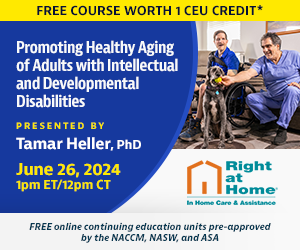▼ ADVERTISEMENT

Editor's E-Note
The subject of this month’s exclusive is geroscience—the interdisciplinary field of study that looks at the biological underpinnings of aging. Contributor Keith Loria discusses the findings of a study funded by the National Institute of Aging about the role of epigenetic aging markers in predicting health outcomes and mortality.
In addition to reading our e-newsletter, be sure to visit Today’s Geriatric Medicine’s website at www.TodaysGeriatricMedicine.com, where you’ll find news and information that’s relevant and reliable. We welcome your feedback at TGMeditor@gvpub.com. Follow Today’s Geriatric Medicine on Facebook and X, formerly known as Twitter, too.
— Kate Jackson, editor |
|
|
|
|
Geroscience: Epigenetic Markers Can Predict Aging and Health
By Keith Loria
Estimating age based on DNA changes can provide insight into health outcomes and mortality in older adults. After all, biological age, assessed through epigenetic changes like DNA methylation, can be indicative of age-related health outcomes, including the onset of chronic diseases, cognitive decline, functional limitations, and mortality.
Nevertheless, other variables such as demographics, socioeconomic status, mental health, and lifestyle choices offer equally reliable, if not stronger, predictions of late-life health outcomes.
▼ ADVERTISEMENT

These conclusions stem from a National Institute on Aging–funded study published in the Proceedings of the National Academy of Sciences led by a group of researchers from the University of Michigan, Yale, and the University of Southern California (USC). In the study, the team investigated whether epigenetic aging markers known as epigenetic clocks could also predict health outcomes and mortality, looking to discover if these clocks offer additional predictive value for health outcomes beyond traditional surveys of social and behavioral factors and conventional biomarkers.
|
Chronic Care Management
Medicare’s Chronic Care Management program gets results, according to early research, but participation in the program has been limited. KFF Health News reports on the program and its failure thus far to meet expectations.
ChatGPT and Decision Support
A Mass General Brigham MESH Incubator research team has determined that ChatGPT may be useful for clinical decision support for medication management and deprescription for geriatric patients. Health IT Analytics reports on the study published in the Journal of Medical Systems.
Postsurgical Complications and Death in Geriatric Patients
According to a study published in the Journal of the American College of Surgeons, both frailty and procedure risk are associated with increased risk of postoperative complications and death, but procedure risk had a greater adverse influence on outcomes than did frailty alone.
Driving and Dementia
A study reported in JAMA Network Open looks at the correlation between mandatory fitness to drive reporting of dementia—which may be aversive both to patients and clinicians—and the underdiagnosing of dementia. |
Next Level Telemedicine Platform
EMA Telemed, Inc has launched its new telemedicine platform designed to enhance patient outcomes, reduce health care costs, and generate new revenue streams for health care facilities. The platform supports real-time vital sign monitoring through secure video consultations using medically approved sensors, features a user-friendly scheduling tool with automatic reminders for streamlined appointment management, and offers robust data security with encrypted storage and detailed daily health reports. Learn more »
Patient Relationship Management
TeleVox, a provider of omnichannel patient relationship management technology, offers a platform designed to help health care providers move from simple, episodic patient interactions to more comprehensive and meaningful relationships. TeleVox’s Enterprise Edition redefines patient engagement, turning episodic patient experiences into continuous, evolving relationships. Leveraging SMART SMS, it enhances patient experiences, optimizes care, lightens the staff workload, and contributes to the financial success of health systems. Learn more »
Music for Health
In the new book Music and Mind: Harnessing the Arts for Health and Wellness, world-renowned soprano and arts/health advocate Renée Fleming curates a collection of essays from leading scientists, artists, musicians, creative arts therapists, educators, and health care providers about the powerful impact of music and the arts on health and the human experience. Learn more »
The Nocebo Effect
A new book explores the phenomenon of the nocebo effect and its influence on health, particularly during the COVID-19 vaccine rollout. The Nocebo Effect: When Words Make You Sick, published by Mayo Clinic Press, is written by Michael Bernstein, PhD; Charlotte Blease, PhD; Cosima Locher, PhD; and Walter Brown, MD. Learn more » |
| Advertising Opportunities |
Have a product or service you want to market to geriatric care professionals? Utilize the reach of Today's Geriatric Medicine Magazine to accomplish your marketing goals. Email our experienced account executives today at sales@gvpub.com or call 800-278-4400 for more information.
|
| © 2024 Today's Geriatric Medicine Magazine |
|
|